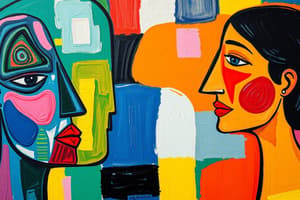Podcast
Questions and Answers
How does Jon's behavior change in different social situations?
How does Jon's behavior change in different social situations?
- He remains the same regardless of context.
- He acts more rude in formal settings.
- He adapts his behavior to fit his roles. (correct)
- He becomes introverted in social gatherings.
What does MOI represent in Marcel Mauss's theory?
What does MOI represent in Marcel Mauss's theory?
- Cultural expectations and behaviors.
- A person's roles in society.
- A person's basic identity and biological givenness. (correct)
- Social concepts of identity.
Which of the following relationships may be influenced by culture according to the content?
Which of the following relationships may be influenced by culture according to the content?
- Romantic relationships exclusively.
- Only familial relationships.
- Only friendships.
- Relationships seen as voluntary or duty-based. (correct)
How does culture affect the perception of achievement?
How does culture affect the perception of achievement?
What can be inferred about Jon's role as a father?
What can be inferred about Jon's role as a father?
Which trait is influenced by culture according to the discussion?
Which trait is influenced by culture according to the discussion?
What is indicated about expressing emotions in different cultures?
What is indicated about expressing emotions in different cultures?
What does PERSONNE encompass in Mauss's theory?
What does PERSONNE encompass in Mauss's theory?
Which characteristic describes the self as being distinct from others?
Which characteristic describes the self as being distinct from others?
What aspect of sociology focuses on how people influence one another’s behavior?
What aspect of sociology focuses on how people influence one another’s behavior?
Which term describes the observable facts or events in human society?
Which term describes the observable facts or events in human society?
Which perspective argues for the relationship between the self and external reality being intertwined?
Which perspective argues for the relationship between the self and external reality being intertwined?
What is meant by the self being described as private?
What is meant by the self being described as private?
How do social networks form according to George Simmel?
How do social networks form according to George Simmel?
Which characteristic implies that the self has a personality that persists over time?
Which characteristic implies that the self has a personality that persists over time?
In the context of the self, how should it be viewed according to social constructivists?
In the context of the self, how should it be viewed according to social constructivists?
Flashcards are hidden until you start studying
Study Notes
Understanding the Self
- The self is defined as separate, self-contained, independent, consistent, unitary, and private.
- The self is distinct from others, allowing individuality and uniqueness.
- Being self-contained and independent means the self exists independently without reliance on external validation.
- Consistency in personality implies that the self endures over time, allowing expectations of behavior.
- The self acts as the center of personal experiences and thoughts, creating a unitary perspective.
- Privacy of the self indicates that individuals process and manage their thoughts, feelings, and information internally.
Sociology's Insight into the Self
- Sociology objectively studies human society and social behaviors.
- Focuses on social interaction, examining how individuals relate to and influence one another.
- Investigates social phenomena, which are observable events within society that affect the self.
Definition of Society
- Society is characterized as a large grouping sharing geographic territory and political authority.
- Dominant cultural expectations govern societal behavior.
- Sociologists explore how societal structures and influences affect individual identity and behavior.
Social Groups and Networks
- Social networks are formed through social groups, as highlighted by sociologist George Simmel.
- Examples of social groups include family and classmates, which shape an individual's social identity.
- Social ties link individuals to these groups, creating a broader support system and community.
Social Constructionist Perspective
- Social Constructionists emphasize the intertwined relationship between the self and societal context.
- This perspective opposes viewing the self as static, advocating for a view of the self that evolves through interactions with external realities.
- The self is seen as dynamic, constantly adapting to societal influences.
Case Study: Jon's Multiple Roles
- Jon exemplifies a multifaceted identity, functioning as a math professor, husband, father, and church member.
- Behavioral adjustments reflect the expectations and norms associated with different social roles.
- As a professor, he maintains professionalism; as a husband, he shows intimacy; and as a father, he adopts sternness.
- Different social settings invoke varying aspects of his personality, showcasing the complexity of the self.
Marcel Mauss's Concepts of Self
- Mauss delineates the self into two aspects: PERSONNE (social identity) and MOI (personal identity).
- MOI encompasses an individual's basic identity and biological aspects.
- PERSONNE includes social constructs shaped by family, religion, nationality, and societal expectations.
Cultural Impact on the Self
- Culture affects relationships by dictating the nature (voluntary vs. duty-based) of social bonds.
- Individual personality traits such as humility or assertiveness are influenced by cultural values.
- Definitions of success and achievement are shaped by cultural perspectives, impacting personal aspirations.
- Emotional expression varies across cultures, affecting how feelings are shown publicly or kept private.
Studying That Suits You
Use AI to generate personalized quizzes and flashcards to suit your learning preferences.




